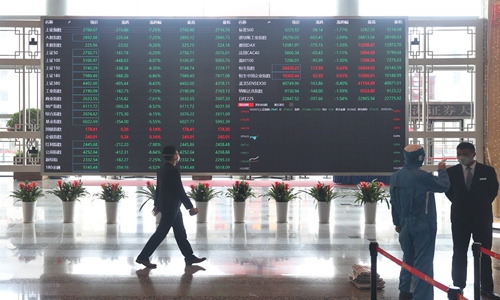
China’s A-share market reopens on Monday, its first trading day of the Year of the Rat, losing heavily across the board. Photo: cnsphotos
Click here to stay tuned with our live updates on Ukraine tensions.China's equity market on Thursday entered a risk-off mode amid escalating Ukraine-Russia tensions that have roiled the global markets, while the Chinese yuan stood out as a safe haven, in a sign of investors' confidence in the Chinese economy, which has remained unfazed by geopolitical uncertainty.
All three major indices in China's A-share market retreated on Thursday, with the flagship Shanghai Composite Index closing down 1.7 percent. The tech-heavy ChiNext index shed 2.11 percent.
In Hong Kong, the benchmark Hang Seng Index lost 3.21 percent, mirroring a global sell-off after Russia started a military operation against Ukraine.
The Chinese yuan, however, retained its strength, hovering around 6.32 against the US dollar, a nearly four-year high.
The yuan's daily fixing against the dollar was set at 6.328 on Thursday, strengthening from the previous day's 6.3313, according to official data.
The Chinese currency has hit a new milestone, with the global share of yuan payments rising to a record high of 3.2 percent in January from 2.7 percent in December, according to SWIFT, the Belgium-based global financial messaging platform.
The sustained strength, despite China's monetary policy independence that has seen the People's Bank of China opting for monetary easing, in stark contrast with the US-led cycle of interest rate hikes, is attributed in part to a shift toward yuan assets, increasingly taken as a resilient choice amid various uncertainties, by global investors, analysts said.
It's likely that the yuan will strengthen to 6.3 per dollar by the year's end, a level that the currency is already nearing, Tan Yaling, head of the China Forex Investment Research Institute, told the Global Times on Thursday.
A significant advance beyond that level remains less likely, Tan said.
The government also addressed concerns over the impact of the yuan's strength on domestic exporters. Foreign exchange fluctuations have a multi-faceted impact on export-oriented firms' production and operations, affecting their bargaining power, costs and earnings, Gao Feng, spokesperson for the Ministry of Commerce, told a regular media briefing on Thursday.
Factoring in greater two-way swings in the yuan over recent years, the ministry has worked with relevant departments to take multiple measures, including compiling risk-hedging booklets and pushing for financial institutions to improve products and services, to help businesses increase their awareness of hedging foreign exchange risks.
While continuing the push for financial institutions to enrich risk-hedging offerings, the ministry will join efforts to improve cross-border trade settlements in the yuan and help the business community to better align with the norm of the yuan's two-way moves, according to Gao.
Global Times




